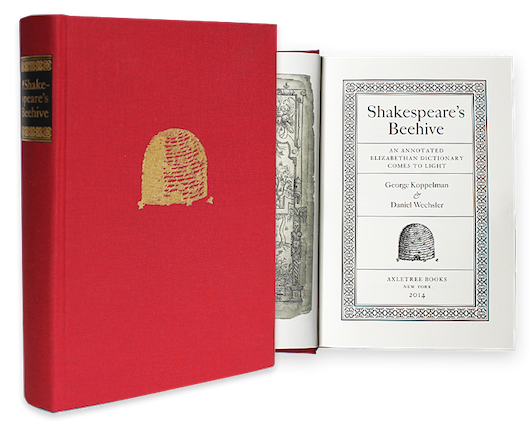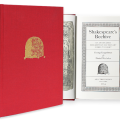
Without a doubt, William Shakespeare is the world’s most famous, some might say, infamous, wordsmith in literary history. Regardless of what one thinks of his work, Shakespeare’s plays have been a staple of high school lit classes for a reason, namely, the beauty with which he expresses the emotions and thoughts of his characters and the eloquence and flow of the dialogue in his plays. For centuries people have speculated that the world famous playwright used a number of source books to help him craft his masterpieces, but there were no accepted examples of such a book that could be traced back to Shakespeare’s personal collection. Until now.
Two rare booksellers who reside in New York claim they own an annotated dictionary they believe belonged to the master bard himself, William Shakespeare. Aside from the initial claim, the most astounding aspect of the story is that the owners say they purchased the dictionary for $4,050 on Ebay back in 2008. The owners, George Koppelman and Daniel Wechsler, are members of the Antiquarian Booksellers’ Association of America, the International League of Antiquarian Booksellers, and the Grolier Club, lending some serious weight to their claim. These are not just a couple of Internet shop-a-holics who just happened to get lucky one day when shopping online. No, Koppelman and Wechsler are serious collectors and sellers, so their careful examination of the volume, along with their years of experience in the field give them serious credibility.
While the dictionary, titled An Alvearie by John Baret, is not signed by Shakespeare, which would have been an almost guaranteed bit of proof that the tome actually belonged to him, there are thousands of annotations throughout the text that were performed by someone dating from the 16th century. The book itself is said to have been published in the 1580s in London, putting it in the proper time period. Many of the annotations in the text are said to give readers a look into Shakespeare’s writing process.
The sellers who own An Alvearie stated that it is amazing that this book has existed for so long, yet has flown under the radar this whole time, never being studied as a possible source book for William Shakespeare’s work despite all of the clues contained in the text. The incredible journey behind the discovery has been chronicled in Shakespeare’s Beehive: An Annotated Elizabethan Dictionary Comes to Light, a 6-year study penned by Koppelman and Wechsler. Some who have reviewed the study believe that while there is not a complete rough draft of any of William Shakespeare’s works contained in the dictionary, there are enough annotations and notes to see a well defined tool kit that was used repeatedly by the author when threading his words together.
A discovery like this one is a big deal, as it gives historians and literature buffs alike a glimpse into the mind of one of the world’s greatest creative geniuses. While the cultural and artistic benefits of such a find are priceless, it is already being speculated that the dictionary could fetch a hefty seven-figure deal should the owners decide to sell it. The Folger Shakespeare Library has published a blog post listing some ways the dictionary should be researched to ascertain its authenticity.




